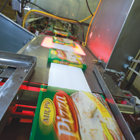
Vision systems that check pizza both before and after cartoning are an important aspect of quality control at Frozen Specialties Inc.
“We are pretty much a make-to-order company,” says president and CEO Ricardo “Ric” Alvarez. “We receive our packaging and many of our ingredients just in time, and we manufacture [primarily] to customer orders.”
It’s a whole different ballgame compared to your local pizzeria, where output may be measured in the dozens. The FSI operations package 150 to 200 million pizzas yearly at rates as high as 175 pies per minute on its fastest line. Pies come in 7-, 9-, and 10-inch diameters.
Single-serve frozen pizza is a core focus for the company-a phrase that takes on literal meaning across the three pizza production lines in its 150,000-square-foot plant in Archbold, Ohio. Each line features machine vision systems at two points, to inspect the pizza both after wrapping and after cartoning.
Things are set in motion after the pies exit blast freezers that operate at -20° F. They are sealed in clear polyethylene film by a Doboy horizontal wrapper fromBosch Packaging Technology, paired with aShanklinheat tunnel.
The wrapped pies are conveyed past aCognexInsight 1000 vision system to ensure they are the right size. A photocell prompts the image capture by the system, which provides fast, real-time inspection data via Ethernet. The system even can detect if the pizzas have shifted after being wrapped.
The pies are then conveyed to aKliklok-Woodmancartoner before being inspected by another Insight 1000 system. This second inspection ensures that the retail cartons have been properly sealed. It can spot flaps that are more than 1/8-inch out of place. Rejected product from either inspection are air-blasted from the line.
Next, the cartons are coded by a unit fromMarkem-Imaje. They are case-packed by an APV Douglas caser fromDouglas Machine, then palletized for shipment by Alvey palletizers fromIntelligrated. The facility also houses two packaging lines for pizza bites, packaged in bags ranging from 10 to 20 ounces. This capability was brought in-house when FSI operations were transferred from Connecticut.
Technology also helps FSI pay close attention to food quality and safety for the ingredients that go into the pizzas. That’s done with a big assist from a tracking system that “license-plates” incoming raw materials with bar code labels. Data for these labels, including lot number, production date, and receipt date, is entered at time of receipt to allow for recalls and monitor inventory age. All rack positions are also assigned a bar code location so FSI personnel know where everything is stored. This allows for 100% warehouse utilization, reduces labor to store and pick, and maintains inventory on a first-in, first-out basis.
FSI recently made an improvement in the name of sustainability by “Right-Sizing” its cartons by 10%.
“We reduced the size of the retail carton and increased the quantity per corrugated master shipper box to maximize the number of pizzas on a pallet,” Alvarez explains.
The quantity of pizzas per corrugated case increased from 12 to 16. This increased the number of pizzas on a pallet by 20%.
“Not only were we able to get more pizzas on an outbound truck, we can store more pizzas in the warehouse,” Alvarez says. Benefits include less packaging and material handling, and reduced transportation costs.
That’s not a bad deal any way you slice it.
-Rick Lingle, executive editor
Editor’s Note: Our thanks to Marina Mayer, managing editor, Snack Food & Wholesale Bakery, for her help with this story.
To access our other 2010 Plants of the Year,click here.
